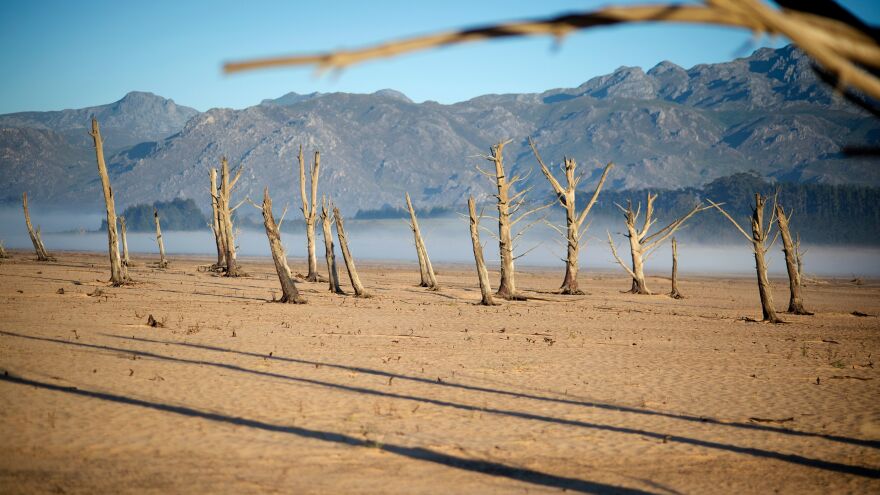Tony Largier grows apples, plums and nectarines at Little Oaks Farm, near Villiersdorp, in South Africa's Western Cape province. It's a beautiful piece of land in a valley between mountains. The closest peak gets snow in the winter.
We walk amid his nectarine trees.
"This variety is summer bright. It's sweet, crunchy. It's a good nectarine. It's one of the newer varieties," says Largier.
He and other farmers in the area pull water from the nearby Elandskloof Dam — part of a network of dams that farmers, villages and the City of Cape Town share.
Farmers here work on a quota system. An irrigation board determines how much water each farmer needs to grow certain crops, and how much the dam can spare. The allocations have gotten smaller amid a three-year drought.
"All these farms pull off the dam, and we have a measured amount that we can pull every year," Largier says. "If you get your 100 percent quota, that would be what they reckon you need to grow a hectare of fruit."
This year, Largier only got a 17 percent allocation, because the Elandskloof Dam is only one-third full.
"You're living on borrowed time at that. Seventeen percent is a huge problem," Largier says.
Agriculture is big business here in the Western Cape. Industry economists estimate that apples and pears are worth hundreds of millions of dollars per year. South Africa is one of the world's largest pear producers.
The Theewaterskloof Dam is the biggest in the network. Located about 85 miles north of Cape Town and about 70 miles east of said port city, it supplies both city and local farmers. It's sitting at just 13 percent capacity.
But here on the dam, there's no water to be seen. It looks like a sunken, sandy beach in the middle of a mountain range. A beach with no water.
Billy Bourbon-Leftley is known as the Strawberry King — which is also the name of his business. He sells strawberries locally and exports plums.
"We start planting in a month, and there's no water. We've ordered the plants. We've paid for the plants. What are we going to do?" he asks.
One thing he will do: Lay off workers. Analysts estimate between 30,000 and 70,000 seasonal workers could lose their jobs this year.
Bourbon-Leftley told his workers that less water means lower yields, and lower yields means he can't afford to hire everyone this season.
He had his dam water shut off earlier this week.
"They're taking the water away to the city. So it's a little bit unfair. As long as there's enough water for us, we don't mind. But with the drought, they're taking more and more water from agriculture," Bourbon-Leftley says.
The water is being diverted to Cape Town to avoid Day Zero, when the city's taps will be shut off and residents will have to stand in line for a daily water ration.
But Kevin Winter, of the Future Water Institute at the University of Cape Town, says curtailing farmers won't prevent Day Zero.
"It's not going to make a massive difference. But anything that allows us to push Day Zero out a little bit further is one management tool," Winter says.
Back at Little Oaks Farm, Largier says he can use water from the dam until next month. After that, he'll rely on boreholes — small wells drilled by machines specifically to obtain water. But he doesn't know how long that will last.
"If the boreholes keep going, I believe, with a push and a shove, I can get through this season," he says.
Largier is worried about the future. If the dams don't fill, there will be no groundwater. And since so many farmers are now relying on boreholes, they're depleting the underground water supply.
Copyright 2022 NPR. To see more, visit https://www.npr.org.


